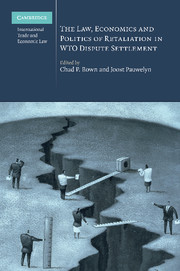Book contents
- Frontmatter
- Contents
- List of tables and figures
- Contributors
- Introduction: trade retaliation in WTO dispute settlement: a multi-disciplinary analysis
- PART I Background and goal(s) of WTO retaliation
- PART II A legal assessment after ten arbitration disputes
- PART III An economic assessment after ten arbitration disputes
- 6 The economics of permissible WTO retaliation
- 7 Sticking to the rules: quantifying the market access that is potentially protected by WTO-sanctioned trade retaliation
- PART IV The domestic politics and procedures for implementing trade retaliation
- PART V Problems and options for reform
- PART VI New frontiers and lessons from other fields
- Index
6 - The economics of permissible WTO retaliation
Published online by Cambridge University Press: 26 February 2010
- Frontmatter
- Contents
- List of tables and figures
- Contributors
- Introduction: trade retaliation in WTO dispute settlement: a multi-disciplinary analysis
- PART I Background and goal(s) of WTO retaliation
- PART II A legal assessment after ten arbitration disputes
- PART III An economic assessment after ten arbitration disputes
- 6 The economics of permissible WTO retaliation
- 7 Sticking to the rules: quantifying the market access that is potentially protected by WTO-sanctioned trade retaliation
- PART IV The domestic politics and procedures for implementing trade retaliation
- PART V Problems and options for reform
- PART VI New frontiers and lessons from other fields
- Index
Summary
Introduction
In the 12 years following the WTO's 1995 inception, ten formal Dispute Settlement Understanding (DSU) cases reached the stage in which the respondent member's failure to comply with WTO obligations compelled DSU arbitrators to authorize the complaining member to retaliate and apply countermeasures. This chapter uses the lens provided by these ten cases to examine how arbitrators employ economic analysis at this critical stage of the DSU process. In order to lend an intellectual coherence to the arbitrators' approach, we first motivate the basis for DSU arbitrations in the WTO trade agreement via use of economic theory, as theory supplies a framework that complements the legal approach and allows arbitrators to put disputes into perspective.
We begin by developing a theoretical approach that facilitates examination of the countermeasure construction for each of the two major categories of prevalent cases in WTO dispute settlement – that is, disputes over WTO-inconsistent import-restricting and export-promoting policies. This is an important initial categorization given that DSU arbitrations have been conducted under two different mandates: that is, those that involve WTO-inconsistent trade restrictive measures and those that involve WTO-inconsistent government subsidies (WTO 2005). In the first, pursuant to DSU, Article 22.7, the duty of the arbitrators is to determine whether the level of suspensions sought by a complaining member is “equivalent to the level of nullification and impairment” that resulted from the breach of WTO obligations.
- Type
- Chapter
- Information
- Publisher: Cambridge University PressPrint publication year: 2010
- 11
- Cited by



